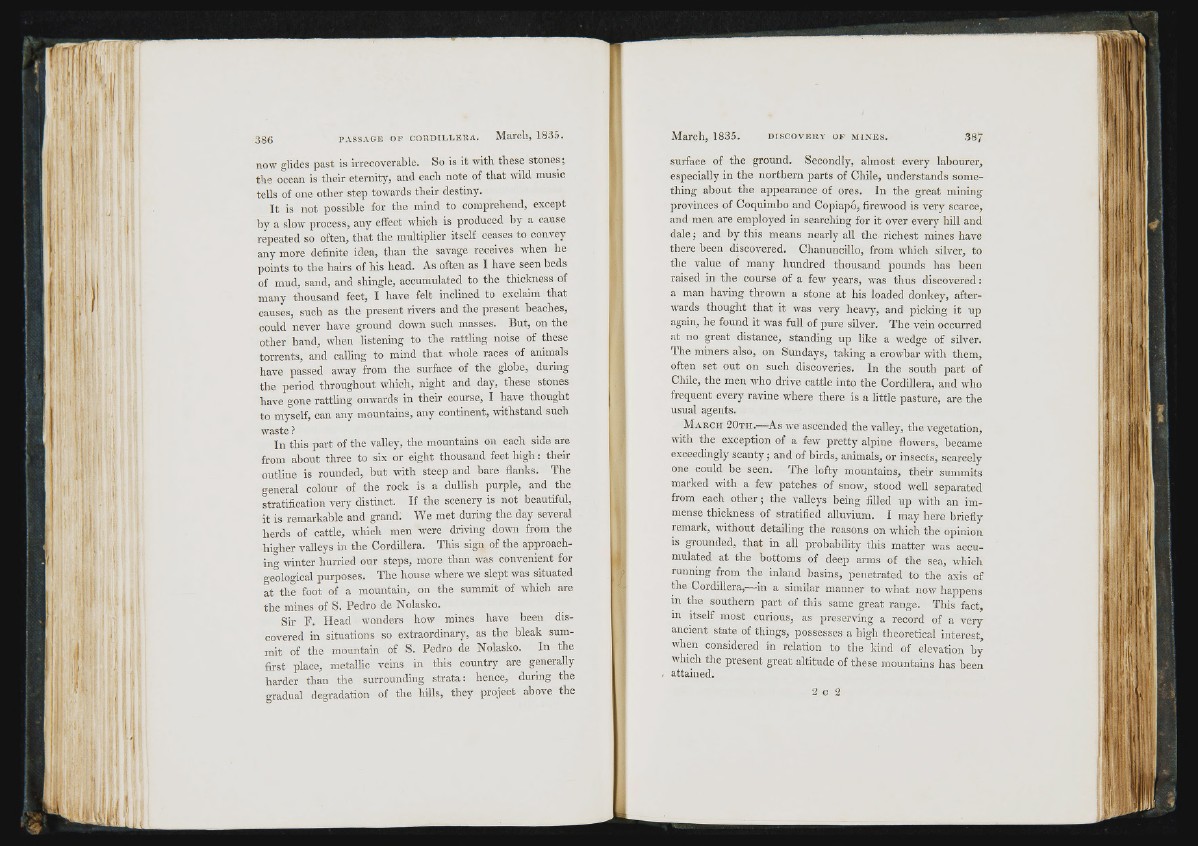
, I ■■ I i * i ' V '
:'r ir i
; ! U ', -■ 1 ! 1 W
: '
now glides past is irrecoverable. So is it with tliese stones;
the ocean is their eternity, and each note of that wild music
tells of one other step towards their destiny.
It is not possible for the mind to comprehend, except
hy a slow process, any effect which is produced by a cause
repeated so often, that the multiplier itself ceases to convey
any more definite idea, than the savage receives when he
points to the hairs of his head. As often as I have seen beds
of mud, sand, and shingle, accumulated to the thickness of
many thousand feet, I have felt inclined to exclaim that
causes, such as the present rivers and the present beaches,
could never have ground down such masses. But, on the
other hand, when listening to the rattling noise of these
torrents, and calling to mind that whole races of animals
have passed away from the surface of the globe, during
the period throughout which, night and day, these stones
have gone rattling onwards in their course, I have thought
to myself, can any mountains, any continent, withstand such
waste ?
In this part of the valley, the mountains on each side are
from about three to six or eight thousand feet high: their
outline is rounded, but with steep and bare flanks. The
general colour of the rock is a dullish purple, and the
stratification very distinct. If the scenery is not beautiful,
it is remarkable and grand. We met during the day several
herds of cattle, which men were driving dovm from the
higher valleys in the Cordillera. This sign of the approaching
winter hurried our steps, more than was convenient for
geological purposes. The house where we slept was situated
at the foot of a mountain, on the summit of which are
the mines of S. Pedro de Nolasko.
Sir F. Head wonders how mines have been discovered
in situations so extraordinary, as the bleak summit
of the mountain of S. Pedro de Nolasko. In the
first place, metallic veins in this country are generally
harder than the surrounding strata: hence, during the
gradual degradation of the hills, they project above the
surface of the ground. Secondly, almost every labourer,
especially in the northern parts of Chile, understands something
about the appearance of ores. In the great mining
provinces of Coquimbo and Copiapo, firewood is very scarce,
and men are employed in searching for it over every hill and
dale; and by this means nearly all the richest mines have
there been discovered. Chanuncillo, from which silver, to
the value of many hundred thousand pounds has been
raised in the course of a few years, was thus discovered:
a man having thrown a stone at his loaded donkey, afterwards
thought that it was very heavy, and picking it up
again, he found it was full of pure silver. The vein occurred
at no great distance, standing up like a wedge of silver.
The miners also, on Sundays, taking a crowbar with them,
often set out on such discoveries. In the south part of
Chile, the men who drive cattle into the Cordillera, and who
frequent every ravine where there is a little pasture, are the
usual agents.
M a r c h 2 0 t h .—As we ascended the valley, the vegetation,
with the exception of a few pretty alpine flowers, became
exceedingly scanty; and of birds, animals, or insects, scarcely
one could be seen. The lofty mountains, their summits
marked with a few patches of snow, stood well separated
from each other; the valleys being filled up with an immense
thickness of stratified alluvium. I may here briefly
remark, without detailing the reasons on which the opinion
is grounded, that in all probability this matter was accumulated
at the bottoms of deep arms of the sea, whicli
running from the inland basins, penetrated to the axis of
the Cordillera,—in a similar manner to what now happens
in the southern part of this same great range. This fact,
m itself most curious, as preserving a record of a very
ancient state of things, possesses a high theoretical interest,
when considered in relation to the kind of elevation by
which the present great altitude of these mountains has been
attained.
'i